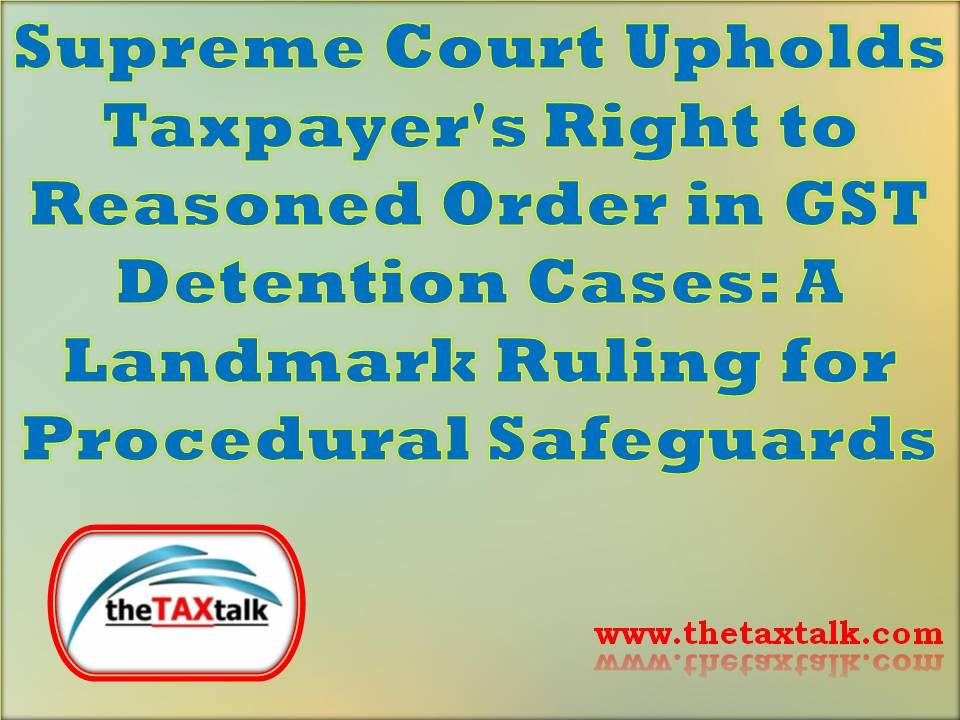![]()
Supreme Court Upholds Taxpayer’s Right to Reasoned Order in GST Detention Cases: A Landmark Ruling for Procedural Safeguards
Introduction: Safeguarding Procedural Justice in GST Regime
The Goods and Services Tax (GST) framework in India aims for seamless tax administration, but the procedural aspects of detention and release of goods often become points of contention. A recent Supreme Court judgment in the case of M/s ASP Traders has significantly reinforced the importance of procedural safeguards under Section 129 of the Central Goods and Services Tax (CGST) Act, 2017. This ruling clarifies that even if a taxpayer “voluntarily” pays tax and penalty to secure the release of detained goods, the tax authorities are still mandated to issue a reasoned, speaking order (Form GST MOV-09), preserving the taxpayer’s crucial right to appeal.
Background of the Case: A Consignment Gone Awry
The appellant, M/s ASP Traders, a registered dealer in Red Arecanut, consigned goods valued at over Rs. 51 lakh. During transit, the consignment was transhipped, leading to a discrepancy of 7 missing bags. On January 17, 2022, the vehicle carrying the goods was detained by the Mobile Squad at Lalitpur Bypass Road, Jhansi. A notice under Section 129(3) of the CGST Act, 2017 (Form GST MOV-07) was subsequently issued, citing discrepancies and alleging that the consignee was non-existent.
Facing business exigencies, M/s ASP Traders deposited Rs. 7,20,440/- towards IGST as indicated in the notice, via Form GST DRC-03, and the goods were released. However, despite repeated requests, no formal order under Section 129(3) in Form GST MOV-09 was passed by the Mobile Squad. The authorities contended that once payment was made, proceedings stood concluded under Section 129(5), rendering a final order unnecessary.
High Court’s Stance and the Appeal to the Supreme Court
The appellant approached the Allahabad High Court, seeking a direction for the authorities to furnish a copy of the order under Section 129(3) or pass a speaking order. The High Court dismissed the writ petition, agreeing with the tax authorities that upon payment, proceedings under Section 129(3) were “deemed to be concluded” as per Section 129(5) of the CGST Act, 2017, and Rule 142(3) of the CGST Rules, 2017.
Aggrieved, M/s ASP Traders appealed to the Supreme Court, arguing that every show cause notice must culminate in a reasoned final order to enable the affected person to avail statutory remedies. They emphasized that the payment was made under protest due to business compulsion, not as an admission of liability.
Supreme Court’s Incisive Analysis: The Mandate of a Speaking Order
The Supreme Court meticulously examined Section 129(3) and Section 129(5) of the CGST Act, 2017, and Rule 142 of the CGST Rules, 2017. Crucially, the Court also referred to Circular No. 41/15/2018-GST dated April 13, 2018, issued by the Central Board of Indirect Taxes and Customs (CBIC), which is binding on the department.
The Court held that the “deeming fiction” under Section 129(5) – that proceedings are concluded upon payment – merely signifies that no further prosecution will be initiated. It does not absolve the proper officer from passing a formal, reasoned order in Form GST MOV-09, with a summary uploaded in Form GST DRC-07, as mandated by Rule 142(5) and the CBIC Circular.
The Supreme Court highlighted several critical points:
Mandatory Nature of Order: Section 129(3) explicitly states that the officer “shall issue a notice… and thereafter, pass an order,” reinforcing the mandatory nature of a formal order.
Right to Appeal: A reasoned order is essential to preserve the taxpayer’s statutory right to appeal under Section 107 of the CGST Act, 2017. Without such an order, the right to appeal becomes illusory.
Payment Under Protest: The Court acknowledged that payments made due to business exigencies or under commercial compulsion, especially when there are no mechanisms to record “payment under protest” on the GST portal (Form GST DRC-03), should not be construed as voluntary admission of liability.
Written Objections Prevail: If written objections are filed, they must be considered, and a speaking order addressing each contention is imperative.
Implications of the Landmark Judgment
This Supreme Court decision is a significant victory for taxpayers, reinforcing principles of natural justice and procedural fairness within the GST regime. Key implications include:
Protection of Appeal Rights: Taxpayers will now have a clear, appealable order, allowing them to challenge the levy of tax and penalty, even if they paid to secure immediate release of goods.
Accountability of Authorities: The ruling mandates greater accountability from tax officers to follow prescribed procedures, including issuing reasoned orders, rather than relying on the “deemed concluded” provision to avoid adjudication.
Clarity on “Voluntary Payment”: The judgment provides much-needed clarity on what constitutes a “voluntary payment” under the CGST Act, emphasizing that payments made under compulsion for goods release should not automatically prejudice a taxpayer’s rights.
Reinforcement of Circulars: It underscores the binding nature of departmental circulars, like the CBIC’s Circular No. 41/15/2018-GST, which aim to ensure uniformity and proper implementation of the law.
Conclusion: A Step Towards Fairer Tax Administration
The Supreme Court’s ruling in M/s ASP Traders’ case is a testament to the judiciary’s role in upholding the rule of law and safeguarding taxpayer rights. It ensures that procedural safeguards cannot be bypassed by a mere “deeming fiction” in the statute, thereby strengthening the foundation of transparent and fair tax administration in India. This judgment will undoubtedly serve as a crucial precedent for future cases involving similar disputes under the GST laws.
The copy of the order is as under:


